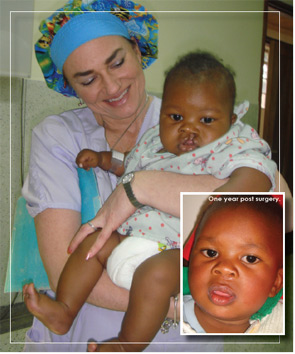Explore This Issue
June 2012Dr. Cordes is clinical associate professor at Indiana University School of Medicine in Indianapolis.

Q: You often do several cases in one day, for many days in a row. This must make for some long days. How do you deal with fatigue?
Lisa J. Molin, MD: The jet lag can be really hard. Fatigue and sleep deprivation are sometimes worse than [what we went through] in residency. Depending on the site, we may have been up for 24 hours when we arrive in the host country. Many times, the hosts feel obliged to wine and dine us. It is their way of showing their gratitude and hospitality, but our surgical team has to get up at 5 a.m. the next morning to do cleft palate and lip repairs.
I’ve worked with Medical Missions for Children in India, Peru, West Africa and the Philippines. Now that I am team leader for our group, returning each year to Angeles City, in the Philippines, we try to rest the first night or two and spend the remaining time with our local hosts. We have a team of 14 people, and we don’t want them operating on only four hours of sleep! We have a great team spirit with our sponsors, the ‘Batch of ’83,’ and they have made our stay and mission to Angeles City very productive.
Dr. Molin is with Ear, Nose and Throat Specialists, Inc., in San Luis Obispo and Pismo Beach, Calif.
Q: Are there factors that foster better outcomes for patients? How do you assess whether the sponsoring organization has addressed those factors?
Dr. McMains: There is great value to making consistent trips to the same location so that you build longstanding relationships, trust and communication. Without this structure in place, I would not schedule a trip. If you are considering involvement with an organization, you can ask them, “What relationships do you have with surgeons in the host country? How is that relationship developed and handled?”
Q: Many otolaryngologists express satisfaction when they have the ability to train their colleagues at the host site, feeling as if they’re closer to the goal of increasing the sustainability of treatments. Do you agree?
Dr. Buckmiller: I have mixed feelings about surgical training [in the host country]. Of course you want a country to be self-sufficient in the way it cares for different types of problems. The unfortunate thing is that cleft surgery is such a complex and precise group of procedures. I have completed eight years of training to be able to do these with the same standard of care. I sometimes hesitate to show someone how to do it and then have them do a very bad job at it the rest of the time. If there is a situation where that group of local people can continue training over long periods of time so that they become proficient, then I’m all for it.
Q: Should trainees be included on surgical missions?
Craig W. Senders, MD, FACS: I have participated in more than 30 missions, and we usually take residents with us. Of course they should be carefully supervised; you have senior surgeons working with them just as you would here in the U.S. Trainees aren’t as fast as experienced surgeons, so cases do take longer. The question is, is that worth doing when you have such a volume of cases you’re trying to handle? It does cost something, but you’re investing in a person who may ‘get the bug’ and go on other trips. For example, Lisa Buckmiller went with us when she trained here at UC Davis. Now, look at how many other people she has gone on to help. We created the seed, and she germinated that seed into a tree.


Leave a Reply